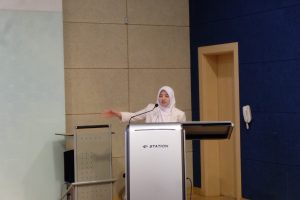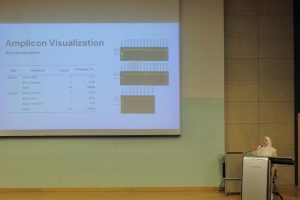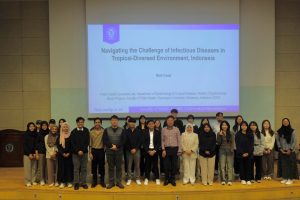On November 7, 2024, Yonsei University’s Wonju Campus served as the stage for an insightful oral presentation by Raisha Nuranindita, a master’s student in epidemiology from the Faculty of Public Health, Universitas Diponegoro. Raisha presented her thesis research titled “Rattus sp. Molecular Characterization as Potential Reservoirs of Leptospirosis in Indonesia” shedding light on a critical zoonotic disease and its implications for public health in her home country.
The invitation to present at this prestigious academic venue came from Prof. Jeon-Bo Young, a renowned scholar at Yonsei University. Raisha was accompanied by her supervisor, Dr. Muh Fauzi, and her colleagues from Universitas Diponegoro’s Faculty of Public Health, reflecting a strong spirit of academic collaboration and support.
Leptospirosis is a severe bacterial disease caused by Leptospira, which is transmitted through contact with water contaminated by the urine of infected animals, including rodents. In regions like Indonesia, where flooding and poor sanitation can exacerbate the risk of disease outbreaks, leptospirosis remains a significant public health challenge. Raisha’s research focused on the molecular characterization of Rattus species, commonly found in Indonesia, to understand their role as potential reservoirs for this disease. By employing advanced molecular techniques, her study identified specific genetic markers that may influence the bacteria’s transmission dynamics and virulence.
Raisha’s presentation outlined her comprehensive research approach, starting with field sampling and identification of rodent species across several leptospirosis-prone areas. She then delved into laboratory analyses that employed cutting-edge molecular methods, such as PCR (Polymerase Chain Reaction) and sequencing, to detect Leptospira DNA within the rodents. The findings revealed crucial insights into the interaction between Rattus species and Leptospira, providing valuable data to inform public health policies and intervention strategies.
The implications of her research extend beyond academia. By highlighting the critical role rodents play in sustaining leptospirosis transmission, Raisha’s work advocates for an integrated public health response. This includes improved environmental sanitation, enhanced rodent control measures, and public education campaigns to reduce human exposure to contaminated water sources. Her research also calls for better diagnostic and surveillance systems to identify outbreaks early and prevent disease escalation.
Presenting her findings at Yonsei University allowed Raisha to share her expertise with an international audience of scholars and public health professionals. The academic setting encouraged dynamic discussions about the global relevance of zoonotic diseases and the need for cross-border collaboration in tackling shared health challenges. Her presentation demonstrated how localized studies, like her research on Indonesia’s Rattus populations, contribute to broader global health initiatives by addressing the root causes of disease transmission in specific contexts.
This experience marked a significant milestone in Raisha’s academic journey. As a representative of Universitas Diponegoro, she exemplified the high standards of research emerging from Indonesia’s academic community. Her work not only highlighted the critical public health challenges faced by developing countries but also showcased the potential of young researchers to contribute meaningfully to global health discourse.
Yonsei University’s Wonju Campus, known for its commitment to fostering academic exchange, provided the ideal platform for Raisha to engage with leading experts and peers. Her presentation was met with keen interest, sparking discussions about future research opportunities, particularly in the area of zoonotic disease management and rodent ecology.
Raisha’s presentation serves as a powerful reminder of the importance of collaborative research and knowledge exchange in addressing diseases that transcend geographical boundaries. Her work underscores the role of rigorous scientific inquiry in solving real-world problems and reflects her dedication to advancing public health in Indonesia and beyond.





Recent Comments